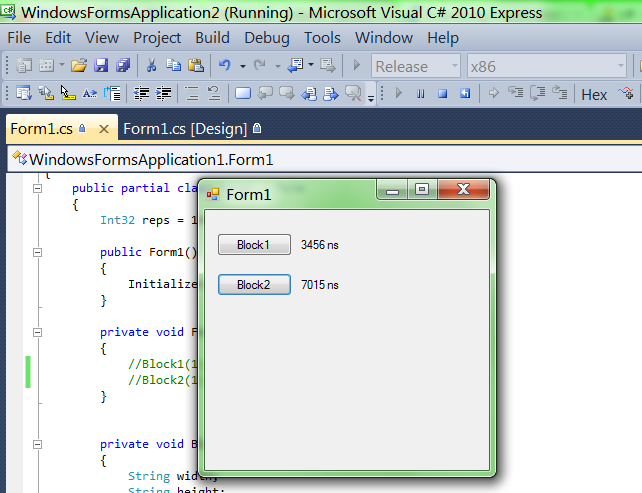Which one of these blocks of code performs better, and which one of them is more readable? I'd guess the gain would be negligible, particularly in the second block. I am just curious.
Block #1
string height; string width; if (myFlag == 1) { height = "60%"; width = "60%"; } else { height = "80%"; width = "80%"; } Block #2
string height = "80%"; string width = "80%"; if (myFlag == 1) { height = "60%"; width = "60%"; } Updated
The results when i tested the above code were that both the blocks performed the same
Block #1
myFlag = 1: 3 Milliseconds myFlag = 0: 3 Milliseconds Block #2
myFlag = 1: 3 Milliseconds myFlag = 0: 3 Milliseconds But one important thing i noticed here(thanks to Matthew Steeples answer here) is that since the block of code that i have tested has not used the variables height and width except for assignment in the if-else and if blocks of Code Block-1 and 2 respectively, the compiler has optimized the IL code by completely removing the if and if-else blocks in question thus showing invalid results for our test here.
I have updated both the code blocks to write the values of both height and width to a file thus using them again and forcing the compiler to run our test blocks(I hope), but you can observe from the code that the actual file writing part does not effect our test results
This is the updated results, C# and IL Code
Results
Block #1
myFlag = 1: 1688 Milliseconds myFlag = 0: 1664 Milliseconds Block #2
myFlag = 1: 1700 Milliseconds myFlag = 0: 1677 Milliseconds C#.net Code
Block #1
public long WithIfAndElse(int myFlag) { Stopwatch myTimer = new Stopwatch(); string someString = ""; myTimer.Start(); for (int i = 0; i < 1000000; i++) { string height; string width; if (myFlag == 1) { height = "60%"; width = "60%"; } else { height = "80%"; width = "80%"; } someString = "Height: " + height + Environment.NewLine + "Width: " + width; } myTimer.Stop(); File.WriteAllText("testifelse.txt", someString); return myTimer.ElapsedMilliseconds; } Block #2
public long WithOnlyIf(int myFlag) { Stopwatch myTimer = new Stopwatch(); string someString = ""; myTimer.Start(); for (int i = 0; i < 1000000; i++) { string height = "80%"; string width = "80%"; if (myFlag == 1) { height = "60%"; width = "60%"; } someString = "Height: " + height + Environment.NewLine + "Width: " + width; } myTimer.Stop(); File.WriteAllText("testif.txt", someString); return myTimer.ElapsedMilliseconds; } IL Code Generated By ildasm.exe
Block #1
.method public hidebysig instance int64 WithIfAndElse(int32 myFlag) cil managed { // Code size 144 (0x90) .maxstack 3 .locals init ([0] class [System]System.Diagnostics.Stopwatch myTimer, [1] string someString, [2] int32 i, [3] string height, [4] string width, [5] string[] CS$0$0000) IL_0000: newobj instance void [System]System.Diagnostics.Stopwatch::.ctor() IL_0005: stloc.0 IL_0006: ldstr "" IL_000b: stloc.1 IL_000c: ldloc.0 IL_000d: callvirt instance void [System]System.Diagnostics.Stopwatch::Start() IL_0012: ldc.i4.0 IL_0013: stloc.2 IL_0014: br.s IL_0070 IL_0016: ldarg.1 IL_0017: ldc.i4.1 IL_0018: bne.un.s IL_0029 IL_001a: ldstr "60%" IL_001f: stloc.3 IL_0020: ldstr "60%" IL_0025: stloc.s width IL_0027: br.s IL_0036 IL_0029: ldstr "80%" IL_002e: stloc.3 IL_002f: ldstr "80%" IL_0034: stloc.s width IL_0036: ldc.i4.5 IL_0037: newarr [mscorlib]System.String IL_003c: stloc.s CS$0$0000 IL_003e: ldloc.s CS$0$0000 IL_0040: ldc.i4.0 IL_0041: ldstr "Height: " IL_0046: stelem.ref IL_0047: ldloc.s CS$0$0000 IL_0049: ldc.i4.1 IL_004a: ldloc.3 IL_004b: stelem.ref IL_004c: ldloc.s CS$0$0000 IL_004e: ldc.i4.2 IL_004f: call string [mscorlib]System.Environment::get_NewLine() IL_0054: stelem.ref IL_0055: ldloc.s CS$0$0000 IL_0057: ldc.i4.3 IL_0058: ldstr "Width: " IL_005d: stelem.ref IL_005e: ldloc.s CS$0$0000 IL_0060: ldc.i4.4 IL_0061: ldloc.s width IL_0063: stelem.ref IL_0064: ldloc.s CS$0$0000 IL_0066: call string [mscorlib]System.String::Concat(string[]) IL_006b: stloc.1 IL_006c: ldloc.2 IL_006d: ldc.i4.1 IL_006e: add IL_006f: stloc.2 IL_0070: ldloc.2 IL_0071: ldc.i4 0xf4240 IL_0076: blt.s IL_0016 IL_0078: ldloc.0 IL_0079: callvirt instance void [System]System.Diagnostics.Stopwatch::Stop() IL_007e: ldstr "testifelse.txt" IL_0083: ldloc.1 IL_0084: call void [mscorlib]System.IO.File::WriteAllText(string, string) IL_0089: ldloc.0 IL_008a: callvirt instance int64 [System]System.Diagnostics.Stopwatch::get_ElapsedMilliseconds() IL_008f: ret } // end of method frmResearch::WithIfAndElse Block #2
.method public hidebysig instance int64 WithOnlyIf(int32 myFlag) cil managed { // Code size 142 (0x8e) .maxstack 3 .locals init ([0] class [System]System.Diagnostics.Stopwatch myTimer, [1] string someString, [2] int32 i, [3] string height, [4] string width, [5] string[] CS$0$0000) IL_0000: newobj instance void [System]System.Diagnostics.Stopwatch::.ctor() IL_0005: stloc.0 IL_0006: ldstr "" IL_000b: stloc.1 IL_000c: ldloc.0 IL_000d: callvirt instance void [System]System.Diagnostics.Stopwatch::Start() IL_0012: ldc.i4.0 IL_0013: stloc.2 IL_0014: br.s IL_006e IL_0016: ldstr "80%" IL_001b: stloc.3 IL_001c: ldstr "80%" IL_0021: stloc.s width IL_0023: ldarg.1 IL_0024: ldc.i4.1 IL_0025: bne.un.s IL_0034 IL_0027: ldstr "60%" IL_002c: stloc.3 IL_002d: ldstr "60%" IL_0032: stloc.s width IL_0034: ldc.i4.5 IL_0035: newarr [mscorlib]System.String IL_003a: stloc.s CS$0$0000 IL_003c: ldloc.s CS$0$0000 IL_003e: ldc.i4.0 IL_003f: ldstr "Height: " IL_0044: stelem.ref IL_0045: ldloc.s CS$0$0000 IL_0047: ldc.i4.1 IL_0048: ldloc.3 IL_0049: stelem.ref IL_004a: ldloc.s CS$0$0000 IL_004c: ldc.i4.2 IL_004d: call string [mscorlib]System.Environment::get_NewLine() IL_0052: stelem.ref IL_0053: ldloc.s CS$0$0000 IL_0055: ldc.i4.3 IL_0056: ldstr "Width: " IL_005b: stelem.ref IL_005c: ldloc.s CS$0$0000 IL_005e: ldc.i4.4 IL_005f: ldloc.s width IL_0061: stelem.ref IL_0062: ldloc.s CS$0$0000 IL_0064: call string [mscorlib]System.String::Concat(string[]) IL_0069: stloc.1 IL_006a: ldloc.2 IL_006b: ldc.i4.1 IL_006c: add IL_006d: stloc.2 IL_006e: ldloc.2 IL_006f: ldc.i4 0xf4240 IL_0074: blt.s IL_0016 IL_0076: ldloc.0 IL_0077: callvirt instance void [System]System.Diagnostics.Stopwatch::Stop() IL_007c: ldstr "testif.txt" IL_0081: ldloc.1 IL_0082: call void [mscorlib]System.IO.File::WriteAllText(string, string) IL_0087: ldloc.0 IL_0088: callvirt instance int64 [System]System.Diagnostics.Stopwatch::get_ElapsedMilliseconds() IL_008d: ret } // end of method frmResearch::WithOnlyIf So we can say that the IF-Else block(Block #1) runs faster than the if block(Block #2) as pointed by many in this forum.



let height,width = if myFlag = 1 then "60%","60%" else "80%","80%"